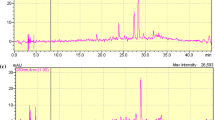Abstract
An experimental investigation was carried out to evaluate the influence the different temperatures at which olives are hammer-crushed and paste kneaded had on the quality of oil and particularly on the phenolic components. The results obtained showed that temperature influenced the diffusion of phenolic compounds in oil. Greater amounts of hydroxytyrosol, tyrosol, caffeic acid, hydroxycaffeic acid and oleuropeine were measured in oils obtained from previously refrigerated olives. Kneading brought about a reduction of total phenols when it was performed on olives crushed at a higher temperature (18 °C) while it led to a slight increase when it was executed on pastes of previously refrigerated olives (6 °C).
Similar content being viewed by others
Author information
Authors and Affiliations
Additional information
Received: 29 February / Revised: 25 April 2000
Rights and permissions
About this article
Cite this article
Caponio, F., Gomes, T. Influence of olive crushing temperature on phenols in olive oils. Eur Food Res Technol 212, 156–159 (2001). https://doi.org/10.1007/s002170000225
Issue Date:
DOI: https://doi.org/10.1007/s002170000225




